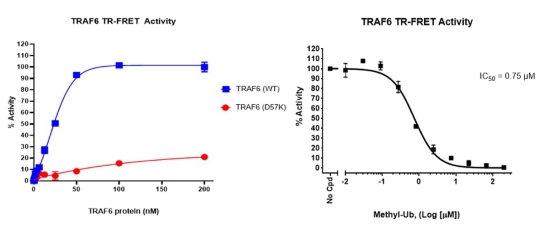TRAF6 Intrachain TR-FRET Assay Kit
The TRAF6 intrachain TR-FRET Assay Kit is a sensitive high-throughput screening (HTS) TR-FRET Assay Kit, designed to measure TRAF6 auto-ubiquitination activity in a homogeneous 384 reaction format. It utilizes a Europium-labeled ubiquitin (Ub) donor as well as Cy5-labeled Ub acceptor to complete the TR-FRET pairing. Since both the TR-FRET donor and acceptor are incorporated into poly-ubiquitin chains formed on TRAF6, this assay measures poly-ubiquitination. As a homogeneous assay, it requires no time-consuming washing steps, making it especially suitable for HTS applications as well as real-time analyses.
 Figure 1. E3 ligase TRAF6 intrachain TR-FRET Assay Kit schematic.
Figure 1. E3 ligase TRAF6 intrachain TR-FRET Assay Kit schematic.
Need us to run inhibitor screens or profile your compounds against TRAF6? Check out our Ubiquitination Screening Services or DNA Replication & Repair Screening Services.
- Fluorescent microplate reader capable of measuring Time Resolved Fluorescence Resonance Energy Transfer (TR-FRET)
- Adjustable micropipettor and sterile tips
- Rotating or rocker platform
| Catalog # | Name | Amount | Storage |
| 80301 | UBE1 (UBA1), FLAG-Tag (E1)* | 50 µg | -80°C |
| 80314 | UbcH5b, His-Tag (E2)* | 60 µg | -80°C |
| 101597 | TRAF6, GST-Tag (E3)* | 16 µg | -80°C |
| 78307 | Ubiquitin Mix (200x) | 50 µl | -80°C |
| ATP (4 mM) | 2 x 1 ml | -80°C | |
| U2 Assay Buffer | 2 x 10 ml | -80°C | |
| White, nonbinding, low volume microtiter plate | Room Temp |
* The initial concentration of enzyme is lot-specific and will be indicated on the tube containing the protein.
The Ubiquitin Mix is sourced from South Bay Bio LLC.
Covalent conjugation to ubiquitin (Ub) is one of the major post-translational modifications that regulates protein stability, function, and localization. Ubiquitination is the concerted action of three enzymes: a Ub-activating enzyme (E1), a Ub-conjugating enzyme (E2), and a Ub ligase (E3). The specificity and efficiency of ubiquitination are largely determined by the E3 enzyme, which directs the last step of the Ub-conjugating cascade by binding to both an E2∼Ub conjugate and a substrate protein. This step ensures the transfer of Ub from E2∼Ub to the substrate, leading to its mono- or poly-ubiquitination.


